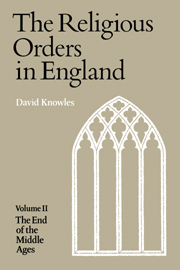Book contents
- Frontmatter
- Contents
- Preface
- List of Abbreviations
- Part One The Historical Framework
- Part Two The Institutional Background
- Chap. XVII Recruitment, employment and the horarium
- Chap. XVIII The wage-system and the common life
- Chap. XIX The election and privileges of the superior
- Chap. XX The numbers of the religious
- Chap. XXI Literary work
- Chap. XXII The monasteries and society
- Chap. XXIII Vicarages, the cure of souls and schools
- Chap. XXIV Public obligations of heads of houses
- Chap. XXV The monastic economy, 1320–1480
- Chap. XXVI Monastic Libraries
- Chap. XXVII Retrospect
- Appendix I Chaucer's monk
- Appendix II Henry V and the Westminster recluse
- Appendix III Regulars as bishops
- Bibliography
- Index
Chap. XXIII - Vicarages, the cure of souls and schools
Published online by Cambridge University Press: 28 January 2010
- Frontmatter
- Contents
- Preface
- List of Abbreviations
- Part One The Historical Framework
- Part Two The Institutional Background
- Chap. XVII Recruitment, employment and the horarium
- Chap. XVIII The wage-system and the common life
- Chap. XIX The election and privileges of the superior
- Chap. XX The numbers of the religious
- Chap. XXI Literary work
- Chap. XXII The monasteries and society
- Chap. XXIII Vicarages, the cure of souls and schools
- Chap. XXIV Public obligations of heads of houses
- Chap. XXV The monastic economy, 1320–1480
- Chap. XXVI Monastic Libraries
- Chap. XXVII Retrospect
- Appendix I Chaucer's monk
- Appendix II Henry V and the Westminster recluse
- Appendix III Regulars as bishops
- Bibliography
- Index
Summary
The relationship of the religious houses to the parochial organization of the country is a complicated topic which has too often been treated in a hasty or superficial manner, and by those who have failed to distinguish between century and century, or who have seen the problems from the point of view of a zealous churchman or nonconformist of the present day. Two weighty circumstances, both independently and in conjunction, have profoundly altered the framework of the Church and the outlook of its members since the end of the Middle Ages. In the first place, the Reformation with its rivalries and counter-reforms, followed by the ages of enlightenment and liberalism, have brought it about that Christians of every confession now regard pastoral and apostolic work as the imperative common task of all ministers of religion. Not only in the Churches separated from Rome, in which the pastoral work is the universal task of the clergy, but even in the Catholic Church itself pastoral work of a parochial kind—the work of the secular clergy par excellence—has been undertaken by monastic orders and regular canons as well as by friars and regular clerks such as the Jesuits. Abstention from such work on the part of any community of clergy has therefore something in it of the unfamiliar.
- Type
- Chapter
- Information
- Religious Orders Vol 2 , pp. 288 - 297Publisher: Cambridge University PressPrint publication year: 1979

